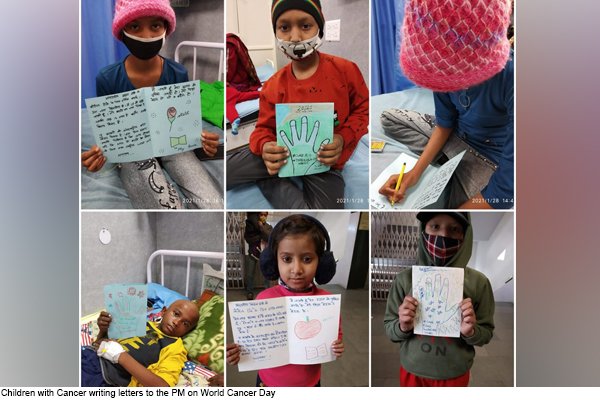New Delhi: On the occasion of World Cancer Day, children and their parents suffering from cancer across India are writing letters to the PM and urging them to formulate a national plan and policy for children’s cancer in India.

For a country like India, which is known for the cancer of more than 25 percent of children in the world, where more than 250 centers treat children suffering from cancer, only 30 percent of those children with cancer are treated in these centers. For the top 10 centers, even the top 10 centers do not have more than 13-15 per cent cancer patients and the survival rate in these hospitals is 10-80 per cent.
Such data is sufficient to characterize and illustrate this serious case in India. For the last 4 years, children of KidscanKonnect, a group of young adolescent cancer survivors and their parents have made 300,000 pledges. Are collected. 3 lakh children are affected by cancer every year in the world. These children are those who have been suffering from cancer since childhood.
All pledges online or through pledge books for children with cancer – parents, health care professionals – doctors, nurses and workers, hospital officials, politicians, celebrities, donors, NGOs, schools, colleges, media and Are derived from civic institutions. It is 300,000 people from all over India and abroad who have signed up and want to get priority in the treatment of cancer of children in India.
Poonam Bagai, president of the Cankids organization, said the WHO Global Initiative for Childhood Cancer (GICC) has set a 60 percent lifesaving target for children with cancer in a low middle-income country like ours and all children with cancer The institution has set a target of 2030 to reduce it. In high-income countries, 80 percent of children will survive cancer, but in low and middle-income countries, only 20 percent of children will survive. This data shows that we are engaged in a war against cancer – and it is time to get this disease included in the National Health Plan and Policy.
Present situation
- India has a 26 percent share in the number of cancer cases of children worldwide. (India 76,000 worldwide 300,000)
- Like India, the proportion of childhood mortality (other than accidental deaths) is increasing in deaths due to childhood deaths in low middle income countries (LMIC).
- The rate of treatment for childhood cancer is actually 70 to 95 percent. 50 to 70 percent high death rate is unacceptable in our country
- There is not enough attention given to the development of awareness, detection, medicine and treatment of children’s cancer compared to adult cancer.
- Children are our future. The world loses 71 years of life for every child who dies of cancer.
- There should not be any financial burden on a family due to cancer. At the same time, due to the treatment of cancer of a child, a family may have to sell their property.
- Better care, better pediatric cancer centers, pediatric oncologists and affordable good quality medicine, access to health services can prevent children from dying.
- Their human right is access to the best possible treatment, care and support.
Only the national policy will change the following line of privilege
- Childhood cancer should be an integral part of India’s cancer control program, with its place clearly defined. Childhood cancer should be a national policy.
- There should be more centers which are adequately staffed and are treating children suffering from cancer appropriately.
- Children with cancer should eventually be treated in dedicated and accredited pediatric oncology centers. There is practically none in the country.
- Pediatric cancer types are treated in which centers (high-risk leukemia should not be treated other than oncology centers. Retinoblastoma eye cancer should only be treated in identified centers.
- The Indian Academy of Pediatrics now defines a child as a person up to the age of 18 years. All children up to 18 years of age should be treated in the pediatric oncology ward.
- Childhood cancer drugs should be affordable – but more importantly quality must be assured. We are not asking for free treatment – but quality treatment. Only he can save lives.
- Government must support and partner with NGOs and institutions to create awareness, promote access, enable early detection and quality diagnosis.
